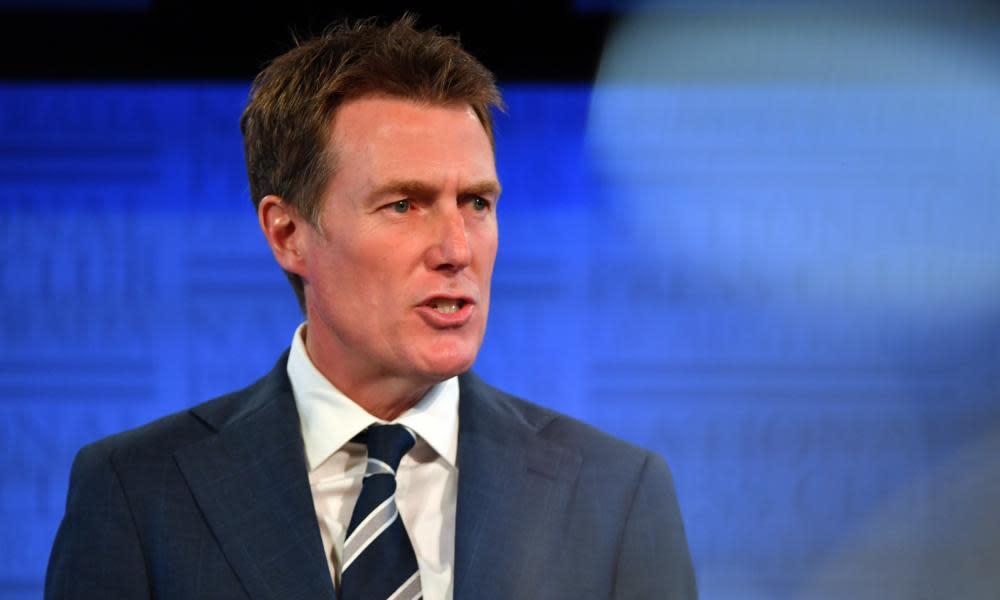Christian Porter calls for Facebook and Twitter to be treated as publishers

Attorney general Christian Porter has called for digital platforms, including social media giants, to be treated like other publishers to create a fair media playing field.
Although the comments on Wednesday were made in the context of defamation law reform, the sweeping statement has broad implications for social media companies’ future legal liability and the Coalition’s response to the digital platforms review.
The Australian Competition and Consumer Commission report, released in July and still awaiting a full government response, called for much broader regulation of social media including transparency on ad algorithms, greater control by users of their data, and codes of conduct on revenue sharing and handling of misinformation on the platforms.
Related: Media companies liable for Facebook comments, judge says in Dylan Voller defamation trial
In a wide-ranging outing at the National Press Club, Porter also signalled the government will shortly announce stronger whistleblower laws, confirmed it would allow religious service providers to refuse to hire staff on the grounds of religion, and agreed to lift the threshold for union deregistration in its Ensuring Integrity bill.
Porter said on 29 November he and his New South Wales counterpart will push for immediate release of new draft model defamation provisions at the council of attorneys general.
Porter said there are areas where it is “clear that sensible reform is required” including introduction of a serious harm threshold for defamation, clarifying that caps on damages for non-economic loss apply regardless of aggravated circumstances and the creation of a broader defence for responsible communications on matters of public interest.
Porter said the “overwhelming bulk of proposals for reform” could be dealt with by July 2020, but the council will also consider “a proposal for stage two reform” in terms of “whether and how to treat online platforms as publishers”.
“My own view is that these online platforms should be held to essentially the same standards as other publishers but that how this should occur requires a sensible measured approach to reform taking into account the differences in the volume of material hosted between Twitter or Facebook and a traditional newspaper for instance,” he said.
“But what is clear is the playing field is not at all fair at the moment.
“After the very curious decision in Voller v Nationwide News & Ors which held that the respective media companies (not Facebook) were, for the purposes of defamation law, the ‘publishers’ of third party comments posted to their public Facebook pages – it is clear that to have a level playing field between online publishers such as Facebook and Twitter and traditional media publishers reform in this area is very necessary.”
On whistleblowers, Porter said that the 2016 Moss review provides a “strong blueprint for reform”. That review called for more support and legal advice for potential whistleblowers and to extend anti-victimisation protections to other witnesses, as well as a power to go public where officials sit on a complaint.
Porter said the government will soon release its response but “this reform process will also go further than the Moss recommendations; to ensure that the essential and overall drafting and structure of the Act is easily and readily understandable to the people who need to use it”.
On Wednesday Pauline Hanson called on the Coalition to immediately release proposed amendments to the Ensuring Integrity bill, which include a demerit point system negotiated with Centre Alliance so first-strike offences cannot trigger deregistration of unions or disqualification of their officials.
“I won’t stand for union bashing and therefore I won’t support the deregistration of organisations for misdemeanour offences like late paperwork submissions,” Hanson said in a statement.
“I have however forewarned union bosses that bullying and thuggery must be stamped out in accordance with public expectations.”
The intervention creates difficulty for Porter, who still needs the votes of either One Nation or Jacqui Lambie to pass the bill even with Centre Alliance support.
At the Press Club, Porter committed to release the amendments and said he expected there to be “general agreement”.
Related: Twitter's political ad ban to limit micro-targeting, putting pressure on Facebook
“I might also note, with respect to Jacqui Lambie – she’s on the public record saying unequivocally that, if Mr [John] Setka was still in the union movement, she’d be supporting the bill. So I’m looking forward to that support.”
Porter confirmed that after consultation on the religious discrimination bill exposure draft there will be “one significant change from its first draft, and that is that religious hospitals and aged care providers will be given protections equivalent to those given to other religious bodies in relation to the employment of staff”.
That change would allow hospitals and aged care to refuse to hire staff based on their religion. But Porter said there was no push for hospitals and little appetite for aged care providers to be able to refuse to take patients or clients based on religion.
Porter conceded he may need Labor support to pass the bill and revealed he will now begin negotiations with Labor over the issue.
“I actually think it’s going to be a debate that’s going to require a degree of bipartisanship and integration of ideas between Liberal and Labor,” he said.
Equality Australia chief executive Anna Brown said there was “remarkable unity between women, LGBTIQ people, people with disabilities, employers and industry groups, unions and legal experts about the dangers of this bill and the unprecedented risks it poses to healthcare and workplaces.”
“Porter’s comments have not addressed any of our concerns with the exposure draft of the Religious Discrimination Bill. Instead, his comments suggest the bill will go further to entrench exemptions for religious organisations,” she said.

 Yahoo News
Yahoo News 
